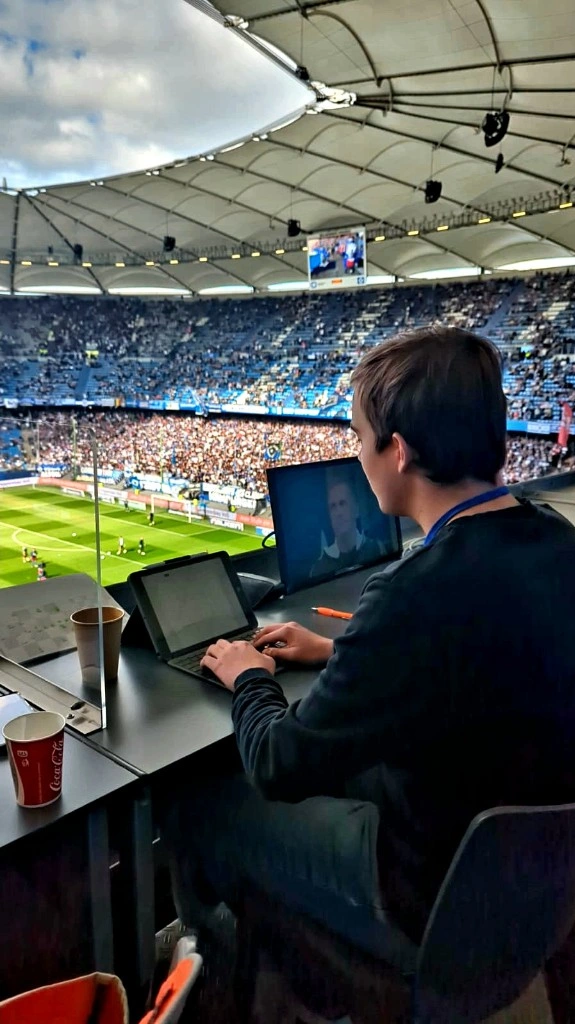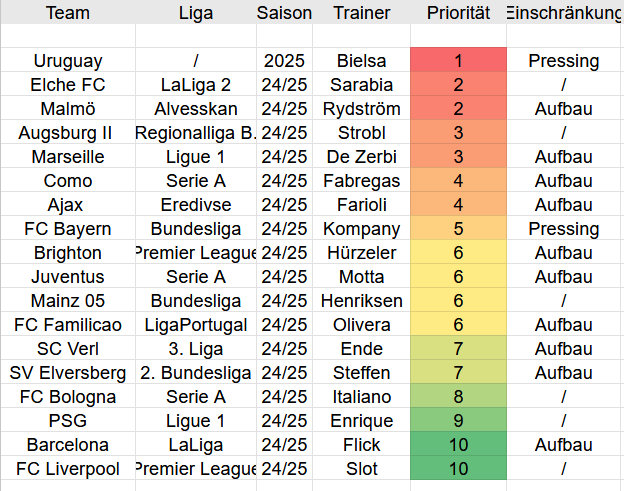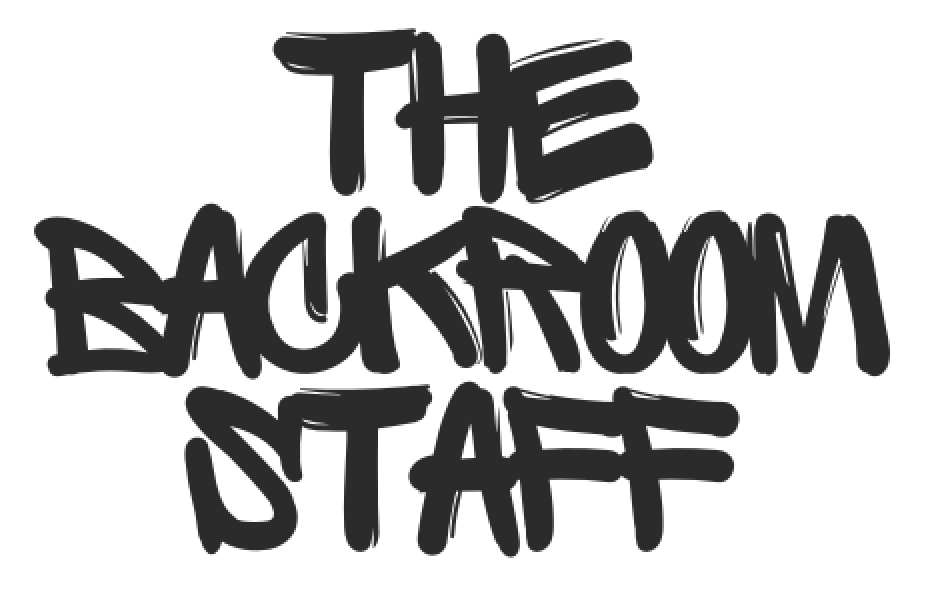Maximilian Aichinger has quickly built an impressive resume as a football writer and analyst. Frustrated by the lack of free, quality content about his favorite club, Jahn Regensburg, he created Der Jahn Blog - today, it is one of the best club blogs around, with hundreds of in-depth articles.
His initiative, sharp analysis and eye-catching writing led to new opportunities - analysis roles in professional football with Regensburg, Unterhaching and a club in Poland’s Ekstraklasa as well as the Bayern Munich tactics blog Miasanrot. Today, still just 18, he’s a writer and editor at the legendary and influential tactics blog Spielverlagerung, part of a talented new generation of analysts.
In this interview, Maximilian shares how he got started in football media and analysis, how opportunities have come his way and achieving his dream to work in professional football. He’s incredibly knowledgeable and thoughtful about the game - enjoy!
The interview has been condensed and lightly edited for grammar and clarity.

[ Where did your interest in football tactics and analysis come from? ]
Like many, I began playing when I was 4 or 5 years old. I played as a goalkeeper at a decent level for a youth team in my hometown. I guess I wasn’t completely useless (laughs).
But the position shaped me and how I saw the game. As a goalkeeper, you always see the game from a different perspective. You see all the players and the whole pitch in front of you, it’s a natural leadership position and I always tried to be an active communicator and give instructions to my teammates.
As a player, I was trying to influence the structure of my team - and the defenders especially. That’s how I got into this tactics thing. I started to read about tactics and look for new ways to organize a team. This curiosity eventually led me deeper into analysis and coaching.
[ What motivated you to start Der Jahn Blog? ]
I love the club. I’ve been a fan since I was a kid.
There wasn’t a lot of quality content about the club available for free. You always had to pay to access it and this always made me furious. So I wanted to do it. I care deeply and had ideas about how to make a blog. I’m a person who doesn’t overthink things, so I started.
I never expected it to grow the way it has over the past three years. When I look back, those first articles really weren’t very good - but the intent was there. It started with that simple idea: to ‘go deep rather than chase clicks.’
Now we’re a team of six - all passionate about the club, all motivated by that same idea.
I’m less involved than in the beginning because of my responsibilities to other projects but we are in constant exchange. It’s a small ecosystem and all share the same passion. We try to make at least 2 posts per week - one before the game and one after the game. This is something unique that a lot of small clubs in Germany don’t have, so I’m very proud that we’ve created this.
"I’m a person who doesn’t overthink things, so I started"
[ Were you already interested in writing or was this the beginning? ]
I had written before, but not publicly. Writing was a personal tool, when you write, you confront your own blind spots and think more clearly. So, I’d written for my own notes but Der Jahn Blog was the start of writing publicly.
[ Has there been any recognition, connection or support with the club? ]
We are in the media section at the games and have a connection to the club. We have had many interviews with coaches and players. We have a good relationship, they know the value the fan blog has and the importance of the connection between the fans and the club.
Personally, it’s something unique. As a fan, you don’t normally have this access. When I was 15 or 16 in the media section for example - even if I was probably a bit naive sometimes - it’s very cool and I love to write about my own club and share in-depth ideas. I’m genuinely grateful to the club and the media team for the openness and trust early on - that kind of support isn’t something you take for granted.
[ How did you find opportunities to work with clubs like Regensburg and later, Unterhaching? ]
To be honest, I didn't find those opportunities - rather, they found me. I have written some articles and I am always in exchange with people from the football world, that’s how these connections were formed. It was probably unusual for the club to see a teenager writing pieces on tactics - which may have made it more noticeable.
With Unterhaching and a Polish club I worked with last year, my writing led to a connection and we got into an exchange and decided to do something together. At Unterhaching for example, I supported them with the youth teams. In Germany, analytics are starting to gain traction, but it’s still not fully established - especially at the youth level. They asked me to come on board and help develop that area.
[ Is most of this work video based or do you also attend training/matches? ]
I’m living in Regensburg and Unterhaching is in Munich - and at 17 or 18, my ‘mobility’ is not perfect - so for the most part, my work has been remote via video. I was in contact with the coaches every day and they would show the videos to the players.
[ How did you start writing at Spielverlagerung? ]
They had a public ‘call for writers’ because they were making a ‘new generation’. They’d had a bit of a gap because many of the guys from the ‘old group’ went into professional football and there wasn’t too much content for 2 or 3 years.
—^interviewer’s note: several of the founders and ‘original’ Spielverlagerung writers are or have worked in professional football at the highest level. Examples include: Martin Rafelt - formerly at Hajduk Split, René Marić - currently assistant at FC Bayern Munich, Adin Osmanbašić - currently assistant at FC Schalke 04 among others
Now, they wanted to start something new. I was at the beginning of my analytics career and my interest in this topic was growing.
To be honest, I didn’t read many of the old articles because I was too young! But I know the guys who wrote there - they’re legends in this ‘tactics bubble’ and it’s really big to follow in their footsteps. It’s a really good environment to learn.
[ Why are the new articles written under the name ‘next generation’ instead of the author’s name (like in the past)? ]
I think it reflects the spirit of the platform. It was never aimed to create ‘personal brands’ or something and ‘next generation’ should be a signal that we are part of something new.
I think our new generation should not imitate or copy the old generation. We have to find our own approach and develop our own frameworks. Otherwise - in my opinion - we risk falling into this syndrome where we are always stuck in the shadow of those who came before us.
So, I think it’s a good idea that we are focused on the collective and not on personal brands from the beginning.
[ How do you generate ideas - and later, decide on the topics you’re going to write about? ]
I can't watch a match without analyzing it - it’s not a choice anymore!
I always take notes, pause and rewind looking for certain movements and patterns. Even when I just sit down and want to watch a game casually, I end up with pages of observations, and that's how it starts every time.
Usually, after I watch a game, I can write about it easily. Mostly, I try to just ask ‘why’ the things I observed happened or worked/didn’t work. For example, ‘why did this pressing work?’ or ‘why did this team overload the left side?’.
Sometimes it’s not optimal that I’m always analyzing - and it can be hard sometimes - but for this kind of work it’s perfect because I don’t have to be in this ‘work mode’, I always write things down anyway. Writing an article is just the final step.
"I can't watch a match without analyzing it - it’s not a choice anymore!"
[ How is your writing and analysis different for e.g. Spielverlagerung compared to your reports for a club? ]
When I write for Spielverlagerung, I want to bring all the details into the article. When I work for a club, I have to set a more specific focus. It’s important that the information can be easily shared and understood by the players.
There was a point where I wanted to do something with players, not only for fans, and to have an impact on something. It’s very cool to write about tactics but I also wanted to have an effect on something and spread my ideas to players and a team. It’s great I can do both.
[ How much football do you watch? ]
I watch a lot of football every day. It’s hard to say exactly, I think it’s better not to count it, to be honest!
Right now, in the off-season, I watch even more games since I don’t have the pressure of writing articles. I keep a long list of interesting themes and coaches from last season in my notebook, and I use this time to follow those closely.

I think in the last two weeks, I’ve probably watched 50 games or so - but usually on double speed. I rarely watch games at normal speed.
[ Do you also watch matches from previous eras or only focus on the most recent seasons? ]
Yes, sometimes I watch some very old games from Cruyff or things like that. To be honest, I’m so young that I also have to watch old games from Messi and players like that - when he was in his prime, I was like 7 years old…
I think, to understand football, you have to understand the past. You can see tactics come and go. For example, we had man marking 60 years ago and now we have it again. It’s very interesting to see these influences and go into this analysis.
[ It seems tactics, analysis and things like advanced stats are becoming more and more popular and ‘mainstream’ - what do you think? ]
Yes, I think tactics have gotten more mainstream attention because of the internet, and fans are more informed because of blogs on statistics sites and more accessible tools. So it’s definitely grown in exposure and popularity but I think this visibility also brings new challenges.
With so much information, there are lots of distractions. A trend I see is the increase in boulevard journalism with a connection to analytics. Often, this leads to a loss of nuance and making analytics fit to ‘tabloids’. You see tactical ideas assigned to some ‘-isms’ that remove many details. Football isn’t binary and is always contextual - no one is only positional or relative, so much is in a grey area. Pragmatism is a very big part of football, even ‘idealists’ like Pep Guardiola have some pragmatism and I think this is often lost in some of the popular tactics discussions.
So, I think this is happening in the foreground. In analysis, I think the translation of ideas is more important than just having ideas. It’s no longer enough to understand tactics, you need to communicate them - from analyst to coach, from coach to player and from plan to performance. That connection, that clarity is where the real edge lies these days.
"Football isn’t binary and is always contextual - no one is only positional or relative, so much is in a grey area"
[ Do you know, or think, coaches - or other people in football - are reading Spielverlagerung? ]
Every day I’m in contact with coaches or assistant coaches from professional clubs - often through calls or messages. Sometimes, I share my articles with them directly. Some very experienced coaches reached out to give me some feedback and that’s really cool.
For example, last season we wrote an article about Red Bull Salzburg and the coach Pepijn Lijnders, who was an assistant to Jürgen Klopp - and from this season for Pep Guardiola, gave us some feedback. I really enjoyed that exchange with Pepijn.
[ You must have your own views on how teams should play - how does this inform your analysis or the topics you write about? ]
As an analyst, I don't have a philosophy. I have to be clear of everything and can’t approach it with any kind of bias or anything like that.
As a fan - or a ‘tactics fan’ - I love watching fluid positional play styles of football. I grew up watching this. As a kid, I was into Barcelona - I even always wanted to play as them in FIFA (laughs). This MSN-Era had a big influence on me and on my own ideas. So, I have my own philosophy but as an analyst, I have to be unbiased.
[ Is there a kind of ‘hierarchy’ between player scouting and team/opposition scouting? (e.g. a ‘prestige’ difference) ]
That's very interesting. In Germany, we don't see them both as scouts. For us, ‘opposition scouts’ are ‘analysts’. I haven’t thought about this relationship, to be honest. I think maybe for the media, talent scouts are more in the foreground but in reality, it’s the same.
I think talent scouting is a very interesting topic and scouts have to go very deep into individual things to try and see if a 7 year old boy can be a professional - it’s a very hard thing. Maybe in the future, I’d do that but for now, I’m fascinated with the collective way of the game, team analytics is my interest and what I want to focus on.
[ Who - besides you :) - is doing your favorite analysis right now? ]
I think I have to mention Moritz - who’s also at Spielverlagerung. He has really good articles on tactical theory. I love to read about theory and it’s something Spielverlagerung did a lot in the past, so I love that we are following in these footsteps with Moritz. He’s somebody I read every time he publishes something.
I also follow several English blogs, like Coaches’ Voice, but honestly, I find that English-language tactical writing isn’t as detailed as I personally like it to be. I really appreciate a deeper level of analysis. Sometimes it feels like the discussion stops far too soon, while in other countries there’s more focus on the finer details.
At Spielverlagerung, we write very long articles and naturally, these don’t have as many clicks as shorter articles. For example, I wrote about Manchester United in January, I think it was 9,000 words. Not many people want to read the whole thing! My advice to the ‘tactics bubble’ would be, ‘don’t look at clicks’.
[ Have you faced any negative bias or had any bad experiences because of your age? ]
Yeah, to be honest, I think it's normal when you are 18 and you are an analyst or a coach to get a negative bias but we have to ignore these things. In the past, I sometimes tried to ‘hide’ my age because of worries people would see me - and my work - negatively. I had some tough experiences early on in my career, but I’ve learned to move past them.
I don’t think a lot about this anymore - if someone wants to think negatively about me, he can. I’ll just do my work. My work isn’t bad because I’m 18, I know this. And if anyone doubts me because of my age, I’ll just let my work speak for itself.
[ How do you think about your goals and next steps? Are you looking for jobs at football clubs again or focusing on writing? ]
As a boy, I dreamed of being a professional footballer. This was my big goal and I think this dream - of professional football - never stopped. I’m somebody who thinks step by step, I don't think in terms of goals or environments really. I just want to follow my curiosity, watch games, ask questions and write things down. I’ve never treated anything I’ve done as ‘career planning’, it’s my hobby after all.
My dream was always to work in football and I do that now, so in a way, my dream is ‘done’. Now, my main work is in a city office and in the afternoon, I work for football but it doesn’t feel like work. I think when you see something as your hobby, as something you can do with your friends, then it’s very cool.
Going forward, the real question for me is always, can I contribute there? Can I learn? Is this a place that values nuance and collaboration?
Whether that's a club or academy or research role or elsewhere, is the work serious? Does it matter? That’s what I’m always looking for. I want to have the feeling that my work is valued and matters. If this is the case, I can think of many roles that could be interesting in the future.
